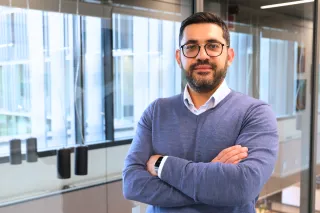With European Parliament elections taking place in June in the Member States of the European Union, there is no point in longing for a return to the old ways. The EU operating environment has changed significantly over the past five years and there are no signs of more stable times ahead. The need for change is being taken into account in Finland’s key EU policy priorities set by the Government: strengthening Europe's strategic competitiveness, improving comprehensive security in Europe and promoting a clean transition, bioeconomy and circular economy. RDI and technology development will play a key role in achieving these well-chosen key objectives.
After the European elections in June, EU countries will adopt a common strategic programme for the next five-year period and the programme will also guide the incoming Commission President. Finland's key objectives are part of the country’s contribution to this process.
It is gratifying to see how well the Government's objectives reflect the importance of RDI, be it the drive for a clean transition, digital leadership or strengthening comprehensive security and the EU's global role. There is consensus in Finland on the role of RDI in promoting productivity growth, creating jobs and increasing well-being. Wide-ranging debate on the subject, which has already happened in Finland, is also urgently needed at EU level. In this, Finland can lead the way.
The objective of strengthening strategic competitiveness emphasises the importance of looking after Europe's own strengths and capabilities, which has unfortunately received little attention in the EU's concrete actions in the five years that are coming to an end. An exception is the European Chips Act, which also strengthens Europe's technological position in semiconductor technologies and applications. The focus must remain on renewal and innovation, not on competition for production subsidies. At the same time, cooperation with trusted partner countries must continue.
The focus must remain on renewal and innovation, not on competition for production subsidies.
Finland's EU targets for the coming years also highlight the impact of EU legislation on business competitiveness and the need to focus on creating a positive investment environment.
The key objectives have identified improving access to a skilled and educated workforce as a key factor in Europe's competitiveness. However, there is a lack of concrete action and the focus is on asylum policy.
EU policy objectives must be reflected in EU funding. The opportunity to do this is even greater now, as the prospective enlargement of the Union will allow for a more radical reassessment of the EU's long-term budget. EU added value will be created by focusing EU funding much more strongly on European public goods such as research and development, climate change mitigation, internal and external security. This is also well reflected in Finland's key objectives. At this time of upheaval, there is no reason to set a fixed EU budget level in advance, but to be open about what is important to implement and finance together at EU level.
The Government wants to make advance influencing a key priority for each ministry. I believe that it is also easy for political actors and stakeholders to stand behind Finland's EU objectives: strategic competitiveness, comprehensive security and clean transition. Let's now take them forward together on a broad front.




